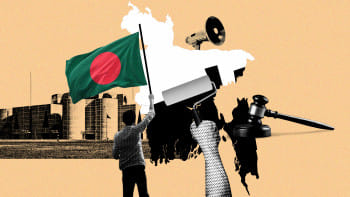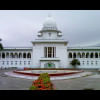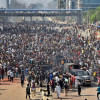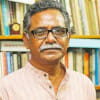Dr Yunus: From pariah to leader

For years, Nobel Peace Prize laureate Muhammad Yunus faced intense persecution in Bangladesh, largely due to animosity from the country's long-term leader, Sheikh Hasina. Theories about Hasina's hostility ranged from jealousy to fear of Yunus's global influence. Despite his international acclaim, including a Nobel Prize and numerous other awards, Yunus was subjected to hundreds of lawsuits and accusations during Hasina's decade and a half of increasingly autocratic regime.
In June 2024, Yunus, globally renowned as a thinker and activist who championed the cause of the poor, found himself, along with 13 of his colleagues, standing in an iron cage during a kangaroo court trial related to his decades of leadership as the Managing Director of the iconic Grameen Bank (GB), the co-winner of the Nobel Peace Prize, and its galaxy of sister organisations, each modeled on what Yunus called a "social business." These were mission-driven organisations whose main purpose was to empower the poor. Their goal was not to maximise profits, but to ensure long-term sustainability and to uplift millions from poverty.
His unlikely journey to global fame as an anti-poverty crusader and social thinker with new ideas began in 1974 near the village called Jobra, situated not too far from the campus of Chittagong University, Bangladesh, where he taught economics and served as the chair of the Department of Economics.
Eventually, through trials and error and real-world experimentation, he founded the Grameen Bank to help rural women escape poverty using an innovative financial model called micro-credit (later microfinance), based on pragmatic thinking. He was committed to solving the ancient problem of poverty through experimentation. This led him to create an entirely new model of poverty alleviation based not on textbook economic theories, but on the realities in rural Bangladesh, and informed by ideas from behavioural economics and sociology.
Despite facing significant challenges, Yunus's dedication to economic and social development eventually made him into a global icon in the war on poverty. Known as the "banker to the poor" (based on the title of his 1998 autobiography), today Yunus is a global celebrity. He has been honoured not just with a Nobel Prize but also with the US Presidential Medal of Freedom (awarded by former President Barack Obama) and the US Congressional Gold Medal, along with more than a dozen other prestigious awards. His close ties with French President Emmanuel Macron, who recently invited him to participate as an adviser at the 2024 Paris Olympics, former US Presidents Jimmy Carter and Bill Clinton, former US Secretary of State Hillary Clinton, and luminaries like Bono and Richard Branson have added to his profile in the global arena.
Alas, his storied journey was anything but smooth. Starting in 2011, Yunus suffered years of persecution. He was unceremoniously expelled from his own institution, the Grameen Bank, and later faced more than 150 unsubstantiated cases lodged to harass him by the autocratic government of Sheikh Hasina. His persecution entangled his colleagues and employees of the Grameen Bank and its many sister organisations. A few of them became victims of forced disappearances and were kept in a place known as "Aynaghor," or the "House of Mirrors." These were part of secret torture chambers across the city, run by rogue elements in law enforcement during the Hasina regime. On August 5, 2024, following weeks of student-led protests during which hundreds of students were killed and injured, in a dramatic reversal of fortunes, Hasina was ousted, and Muhammad Yunus was chosen unanimously by the victorious student leaders to lead Bangladesh's transitional government. On August 8, he took the oath of office as chief adviser of the interim government.
Born in 1940 in Chittagong, a port city on the southeastern coast of Bangladesh, Yunus studied economics as an undergraduate student at Dhaka University. Later, he started his own packaging and printing business in his home city, but moved to the United States upon receiving the prestigious Fulbright scholarship to attend Vanderbilt University in Nashville, Tennessee. In 1969, he earned a doctorate in economics, writing his doctoral dissertation under the supervision of the renowned Romanian scholar and economist, Professor Nicholas Georgescu-Roegen.
When Yunus was teaching economics at Middle Tennessee State University near Nashville, his homeland of East Pakistan (which would become the nation-state of Bangladesh) was engulfed in a political conflict leading to a grave humanitarian crisis. In 1970, Sheikh Mujibur Rahman's party won a decisive victory in the elections, following years of discrimination and neglect faced by the Bengali-speaking population of East Pakistan. The Pakistani military dictator, Yahya Khan, launched a violent crackdown, which led to the nine-month armed resistance and the liberation war. After intense violence and one of the largest forced migrations the world had witnessed, with some 10 million refugees seeking shelter in neighbouring India, the war ended with the birth of an independent Bangladesh.
Always an activist, during the months of struggle, Yunus joined a few other members of the Bangladeshi diaspora in the US and travelled from Nashville to Washington to plead with members of US Congress to stop supporting the Pakistani military amid its genocidal campaign in East Pakistan. Throughout the 1971 war, the Nixon administration had maintained a foreign policy largely supportive of West Pakistan, despite widespread evidence of brutal repression and human rights violations committed by Pakistan's military junta.
After the liberation of Bangladesh on December 16, 1971, there was a need for massive reconstruction of the nation ravaged by years of war in which millions had perished. The US National Security Adviser Henry Kissinger, no friend of Bangladesh, continued to prioritise geopolitical interests over humanitarian concerns faced by the new nation in distress.
In 1974, this policy translated into delayed food shipments for a nation already on the brink of famine. Bangladeshi economist, Professor Rehman Sobhan, wrote that because the Bangladeshi government had moved to strengthen trade relations with Cuba, Kissinger decided to penalise the new nation. The liberation war had already devastated Bangladesh's economy and infrastructure. News of a poor harvest and concern over shortages led to panic-buying and destabilising speculation in rice markets. The increase in the price of rice, along with other factors, resulted in the 1974 Bangladesh famine. This was a major humanitarian disaster which by some estimates led to more than a million deaths.
Despite facing significant challenges during his long career, Professor Yunus's dedication to economic and social development has made him a widely respected global icon. His recent appointment as the head of Bangladesh's interim government has led to an outpouring of support and renewed hope for a nation suffering years of tyranny. Now that he has attained not just international prominence, but also executive power, it remains to be seen how his vision, his work on poverty alleviation, his global network of influential admirers, and his experience as a social entrepreneur might alter the course of Bangladesh and its 173 million people.
Munir Quddus is a professor of economics and dean of the College of Business at Prairie View A&M University in Texas.
This is a condensed version of the article originally appeared on September 3, 2024, in New Lines Magazine.
Views expressed in this article are the author's own.
Follow The Daily Star Opinion on Facebook for the latest opinions, commentaries and analyses by experts and professionals. To contribute your article or letter to The Daily Star Opinion, see our guidelines for submission.

 For all latest news, follow The Daily Star's Google News channel.
For all latest news, follow The Daily Star's Google News channel. 









Comments